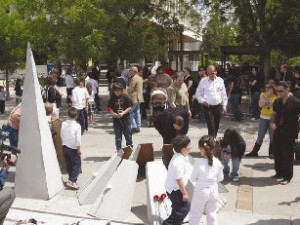Marissa Kalashian
Staff Writer

Every year as April approaches, Armenians are increasingly reminded of the Armenian Genocide, “the forgotten genocide,” which commenced on April 24, 1915 with the massacres of Armenian religious, political, and intellectual leaders in Constantinople. In Fresno, where there is a considerable Armenian population, the Genocide issue is constantly alive, and Armenians take the opportunity in April to remind the rest of the world of the first Genocide of the twentieth century.
On the evening of Friday, March 6, Fresno State students and local community members gathered on campus to view the documentary, The Armenian Genocide. The CineCulture film series is a semester-long program organized by Professor Mary Husain and the Mass Communication and Journalism Department at Fresno State. The objective of CineCulture is to present films that promote diversity through cultural themes, followed up by a post-film discussion led by professors of Fresno State. AfterThe Armenian Genocide, Professor Barlow Der Mugrdechian, Coordinator of the Armenian Studies Program, solicited questions from the audience and prompted a lively and interesting discussion.
Written and directed by documentary filmmaker Andrew Goldberg, The Armenian Genocide first aired on PBS in 2006. The sixty-minute film presents valuable information about the Genocide including interviews with world-renowned genocide scholars, as well as historical accounts from survivors, perpetrators, and eyewitnesses. Experts in the field like Samantha Power, Taner Akçam, Peter Balakian, Vahakn Dadrian, Ara Sarafian, and others appear in this film to explain the historical, political, and social aspects of the genocide. Celebrities also lend themselves to the production by narrating the film and giving voice to the many personal historical accounts from people living at the time of the Genocide.
The documentary provides viewers with a history of Armenians in their homeland from the rise of the Ottoman Empire up to present-day Turkey. The complex aftermath of the Genocide is analyzed, including the reasons behind Turkey’s ongoing denial of the Genocide. Described by one scholar as a “fabricated national memory,” the film captures, through candid interviews, the belief widely-held by many modern Turkish citizens that the Genocide never happened. In these interviews, a number of Turks dispute the claim that 1.5 million Armenians were systematically murdered by the government of the Young Turks from 1915 to 1923, instead claiming that it was a civil war and that both sides suffered. Although the majority of Turks believe the official government story that the Genocide did not occur, there are those who recognize it, as the film also shows. One man recounts how his grandfather told him stories of the killings. For some, it is too difficult to accept that their relatives participated in such atrocities.
As a follow-up to this film, Professor Barlow Der Mugrdechian invited the viewers to respond to the film and opened the floor to questions. A thoughtful discussion ensued in which audience members inquired about several issues including the religious aspects of the Genocide, the limited instances of Armenian resistance, and the modern Turkish government’s continued denial of the Genocide.
After the film and discussion had concluded, CineCulture provided a questionnaire for viewers to complete to share their responses to the film.
 Hye Sharzhoom Armenian Action
Hye Sharzhoom Armenian Action